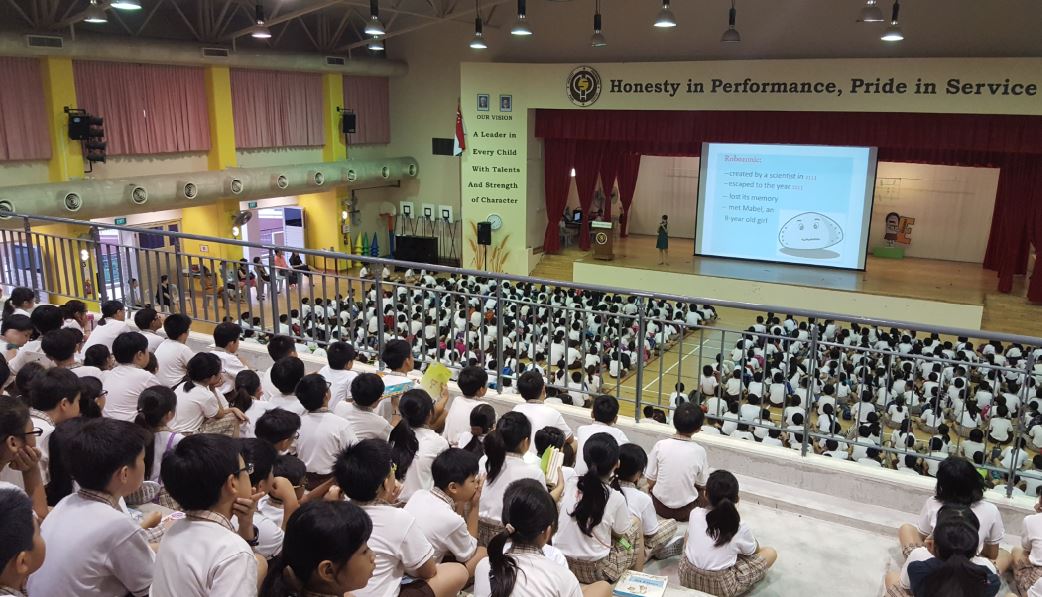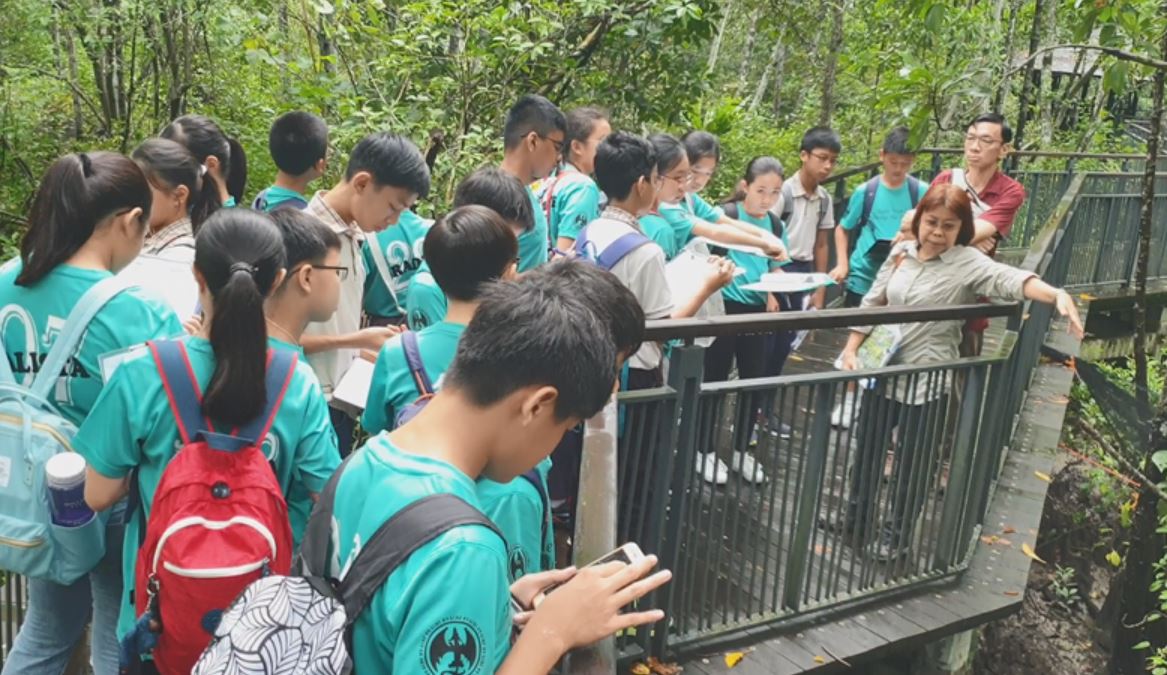Science
We are committed to help students develop a life-long interest in learning Science through a standards-based curriculum that includes inquiry, investigation and experimentation.
Our goals
- To provide authentic learning experiences to connect Science concepts to real life applications and develop students’ creative and critical thinking skills.
- To promote deeper awareness of environmental stewardship that enhances 21CC through enriched outdoor learning experiences using inquiry-based learning.
- To nurture the joy of learning by making Science more fun and relevant, promoting lifelong learning.
Our programmes
PRIMARY 1 & 2
- Junior Science
This programme is mainly integrated into the Primary 1 and 2 curriculum. The JS programme taps on the natural
curiosity of The Primary 1 and 2 students to further develop their Science skills and concepts.
PRIMARY 3
- Fun with Variables
The Variables lesson package is an enrichment lesson for all Primary 3 students that was developed to teach basic process skills related to Science investigation.
The features of the Fun with Variables package include the following:
a) Use of stories to teach variables and fair experiment
b) Explicit teaching of how to carry out simple experiments
c) Followed by introduction of terms such as aim, hypothesis, variables and conclusion.
d) Hands-on activities related to simple investigation that the students carry out in groups
e) Students are assessed using a set of performance-based rubrics
- Every Child a Seed
- Outdoor Learning
- Fern and Flower Gardens, Greenhouse, Terrarium
- Learning Journey to Singapore Zoo
PRIMARY 4
-
Young Investigators Project
-
Heat and Temperature Lesson at Singapore Science Centre
-
Outdoor Learning
- Flower Garden
PRIMARY 5
-
Young Investigators’ Project on Environment
-
W1 CLUSTER YI COMPETITION
Talented Primary 5 students who have carried out outstanding Science investigations during the YIP programme take part in this competition that is conducted at the cluster level.

-
Diversity of Cells Lesson at Singapore Science Centre
-
Outdoor Learning
- Flower Garden and Greenhouse
PRIMARY 6
-
Toy Car Project
-
Outdoor Learning
- Eco Pond, Terrarium
- Learning Journey to Sungei Buloh Wetland Reserve
OTHERS
- Excellence 2000 (E2K)
To engage our high progress learners (from mainstream Primary 4 to 6) in scientific investigations involving more advanced Science concepts. They foster independence in scientific inquiry in students as well as other important 21st Century Competencies such as resilience & resourcefulness, critical & inventive thinking, & effective communication skills. Lessons covered are either based on physical or life Sciences
-
Junior Da Vinci / Nobel / MCurie2 Science Workshops by NUS High School Primary 5 students are selected to participate in the Junior Da Vinci Programme by NUS High School. This programme helps to foster collaboration between the teachers of both schools, giving opportunities to explore other ways to nurture and develop our students’ competencies in the learning of Science especially with respect to the 21st Century Competencies
-
Life Science Enrichment Workshop
-
STEM Training
MORE ABOUT THE PROGRAMMES
- YOUNG INVESTIGATORS’ PROJECT (YIP)
Inquiry-based learning is greatly enhanced by the YIP programme carried out in Primary 4 and 5. It is conducted yearly over a period of five weeks. The Fun with Variables package done in Primary 3 prepares the students for this YIP programme.
A YI resource package, consisting of proposal forms and roles & responsibilities is made available for teachers to refer to and use with their students. This helps to hone leadership and collaborative skills amongst the students. The project helps students to learn and practise critical thinking, inquiry and investigative skills. It helps to foster imagination and creative thought. They learn to work with others as a team, learn discipline in project management and organisational skills. These are essential skills that students need to develop to succeed in life.
- OUTDOOR LEARNING
Learning of Science in HPPS is not bound by the walls of the classroom. Outdoor learning is infused into the curriculum to enrich their learning experiences.
- Learning Journey
Our students get to see first-hand what they have been learning in class and interact actively with nature. The greatest take-away for our students is to be able to share the passion for nature that the teachers / guides have. Through that, they develop greater respect and care for the natural resources that we often take for granted.
**Enrichment Lessons at the Science Centre **
As an extension to classroom experiences, students also attend lessons offered by the Singapore Science Centre that targets at specific topics covered in the syllabus.

SCHEME OF WORK
| Term | Theme / Topic | |||
|---|---|---|---|---|
| Primary 3 | Primary 4 | Primary 5 | Primary 6 | |
| 1 | Diversity: Living and Non- Living Things Diversity: Animals |
Systems: Plant and Human Systems Cycles: Matter |
Cycles: Water and Water Cycle Systems: Cells: Unit of Life Cycles: Human Reproduction |
Energy: Photosynthesis Energy: Forms of Energy and Conversion of Energy |
| 2 | Diversity: Plants, Fungi and Bacteria Cycles: Lifecycle of Plants and Some Animals |
Cycles: Matter Energy: Heat |
Cycles: Plant Reproduction Interactions: Man’s Impact on the Environment |
Interactions: Forces Interactions: Living Together Interactions: Food Chains and Food Webs |
| 3 | Fun with Variables Diversity: Materials Interactions: Magnets |
Energy: Light and Shadows Young Investigators’ Project |
Young Investigators’ Project Systems: Respiratory, Circulatory and Plant Systems |
Interactions: Plant and Animal Adaptations Revision |
| 4 | Interactions: Magnets |
Young Investigators’ Project | Systems: Electrical System | Revision |
The Pedagogy
The Science curriculum at HPPS adopts the pedagogy of Inquiry-based Learning (IBL) in the teaching of Science. We believe that students learn Science best, when they participate actively in learning, in a collaborative and inquiry based classroom.
Active learning through inquiry takes place when students,
-
take ownership of the initial question
-
conduct individual experimentation
-
strive for the outcome they want to see
-
are able to access the needed information easily by knowing what it is that they are looking for
-
are able to communicate their learning with other children through speaking and writing
Through active learning, our students learn better, as the questions they ask help them comprehend and synthesize knowledge.
With the above mentioned as guiding principles, HPPS capitalises on the following strategies to ensure that IBL is carried out holistically.
A. Questioning
In our day-to-day teaching of Science, our teachers focus on asking questions as well as encouraging students to ask relevant questions. Questioning strategy allows for a high degree of student participation as a good mix of low and high level cognitive questions are used.
B. Self-Directed Learning (SDL)
Through SDL, the teaching and learning conditions targeted to meet the needs of our students are established. Here, students take initiatives, set their own goals for learning and follow personal instructional and planning strategies.
C. Cooperative Learning (CoL)
CoL is a well-researched instructional strategy that has been reported to be highly successful in the classroom. It provides students with the tools to effectively work in a collaborative environment. Many of our Science investigations in the classroom provide opportunities for group work.
D. Problem Based Learning (PBL)
PBL focuses on knowing and understanding issues, considering all possible factors, brainstorming for options and eventually deciding on the best solution. As all ideas are initially accepted, problem solving allows for students to find the best possible solution as opposed to the easiest solution or the first solution proposed.
Inquiry-based Learning
IBL is a student-centred learning process based on John Dewey’s learning theory of constructivism. At HPPS, we use the constructivist approach for concept development.
Our approach to learning of Science at HPPS is as follows.
Use of hands-on activities to develop concepts as students make connections with their surroundings
Carrying out inquiry-based activities in and out of the classroom that teaches our students skills through, creative problem solving, decision-making and investigation processes
Providing opportunities to apply concepts in varied contexts through authentic outdoor learning, use of ICT, self-directed as well as collaborative learning experiences
The skills and attitudes we hope to nurture in our students through the Science curriculum is aligned to our Learning Framework. Developing innovation and talent are also included in the Science curriculum, giving our students the opportunity to showcase their creativity and aptitude for Science, through our school-based programmes.
Learning experiences also aim to inculcate ethics and attitudes such as, Curiosity, Creativity, Integrity, Objectivity, Open-mindedness, Perseverance and Responsibility, in our students.
These skills, ethics and attitudes are in line with the 21st Century Competencies, such as Civic Literacy, Global Awareness and Cross-cultural Skills, Critical and Inventive Thinking, and Information and Communication Skills in order to realise our vision of seeing our students growing up to become confident people, self-directed learners, concerned citizens, and active contributors to the nation.

